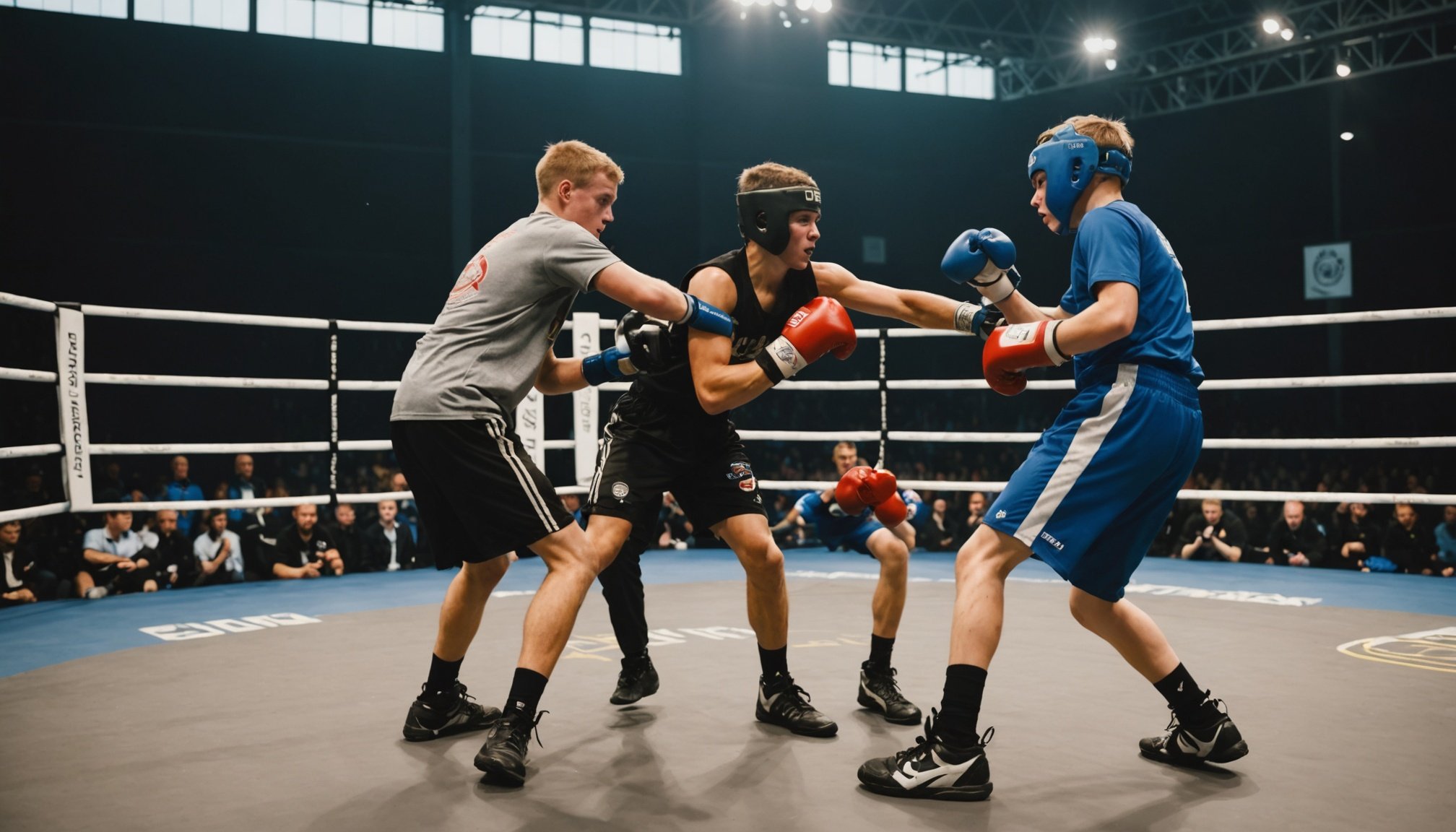Exploring the Ethical Dimensions of Encouraging Youth Participation in UK Combat Sports to Combat Sports and Youth Participation
Combat sports, such as taekwondo, boxing, and judo, have been a part of the sporting landscape for centuries, offering a unique blend of physical activity, mental discipline, and social interaction. In recent years, there has been a growing interest in the benefits and ethical considerations of encouraging youth participation in these sports. This article delves into the ethical dimensions of promoting combat sports among young people in the UK, examining the benefits, challenges, and best practices.
Benefits of Combat Sports for Youth
Combat sports offer a myriad of benefits for young participants, ranging from physical health improvements to psychological and social advantages.
Also read : Exploring the Newest Safety Regulations for Protective Headgear in Combat Sports Across the UK
Physical Health Benefits
- Improved Cardiovascular Health: Combat sports are high-intensity activities that enhance cardiovascular fitness, reducing the risk of heart diseases and improving overall physical health.
- Increased Strength and Flexibility: Regular practice in martial arts can significantly improve muscular strength and flexibility, which are crucial for overall physical development.
- Weight Management: The physical demands of combat sports help in maintaining a healthy weight, which is particularly important for children and adolescents.
Psychological Outcomes
- Enhanced Self-Esteem: Participating in combat sports can boost self-esteem and confidence, as young martial artists achieve milestones and progress through ranks.
- Stress Reduction: The physical and mental discipline required in martial arts can help in managing stress and anxiety.
- Improved Focus and Concentration: The structured environment of combat sports training enhances focus and concentration, skills that are beneficial in both academic and personal life.
Social Psychological Benefits
- Social Connections: Combat sports provide a platform for young people to form strong social bonds with their peers and coaches, fostering a sense of community and belonging.
- Discipline and Respect: Traditional martial arts emphasize the importance of respect, discipline, and self-control, which are valuable life skills.
- Leadership Skills: As young martial artists progress, they often take on leadership roles within their clubs, developing essential leadership skills.
Ethical Considerations in Encouraging Youth Participation
While the benefits of combat sports for youth are numerous, there are several ethical considerations that need to be addressed.
Safety and Injury Prevention
- Proper Training and Equipment: Ensuring that young participants have access to proper training, equipment, and safety gear is crucial. This includes high-quality mats, protective gear, and qualified instructors.
- Injury Reporting and Management: Clubs and organizations must have robust systems in place for reporting and managing injuries to ensure the well-being of young athletes.
Consent and Participation
- Informed Consent: Parents or guardians must provide informed consent for their children to participate in combat sports, understanding the potential risks and benefits.
- Voluntary Participation: It is essential to ensure that young people participate voluntarily and are not coerced into joining a sport that they may not be comfortable with.
Coaching and Mentorship
- Qualified Coaches: Coaches should be qualified, experienced, and trained in working with children. They must also undergo background checks to ensure the safety of the young participants.
- Positive Reinforcement: Coaches should use positive reinforcement techniques to encourage young athletes, focusing on development rather than just winning.
Barriers to Participation
Despite the benefits, several barriers can hinder youth participation in combat sports.
Have you seen this : Top Drills to Boost Your Clinch Game in UK Muay Thai
Socioeconomic Barriers
- Cost: Many combat sports clubs and programs can be expensive, making them inaccessible to families from lower socioeconomic backgrounds.
- Accessibility: Some areas may lack accessible facilities or qualified instructors, limiting opportunities for young people to engage in these sports.
Cultural and Social Barriers
- Cultural Perceptions: Some cultures or communities may have negative perceptions about combat sports, viewing them as too aggressive or violent.
- Gender and Ethnicity: There are often disparities in participation rates among different genders and ethnic groups. For example, girls and women from systemically oppressed groups may face additional barriers to participation.
Strategies to Overcome Barriers
To ensure inclusive and equitable participation, several strategies can be implemented:
Financial Support
- Scholarships and Grants: Offering scholarships or grants can help make combat sports more accessible to young people from lower-income families.
- Community Funding: Local communities can fund programs specifically designed to support underprivileged youth.
Cultural Sensitivity
- Inclusive Marketing: Marketing materials should reflect the diversity of the community, encouraging participation from all backgrounds.
- Culturally Sensitive Coaching: Coaches should be trained to be culturally sensitive, understanding and respecting the diverse backgrounds of their students.
Community Engagement
- Partnerships with Schools: Collaborating with schools can help integrate combat sports into physical education programs, making them more accessible.
- Community Outreach: Conducting outreach programs in local communities can raise awareness and encourage participation.
Practical Insights and Actionable Advice
For parents, coaches, and policymakers looking to encourage youth participation in combat sports, here are some practical insights and actionable advice:
For Parents
- Research Local Clubs: Ensure that the club your child joins has qualified coaches, proper safety equipment, and a positive training environment.
- Encourage Balanced Participation: While it’s important to support your child’s interest in combat sports, ensure they also engage in other activities to maintain a balanced lifestyle.
For Coaches
- Focus on Development: Prioritize the development and well-being of young athletes over winning. Use positive reinforcement and emphasize the importance of respect and discipline.
- Continuous Training: Stay updated with the latest coaching techniques and safety protocols to ensure you provide the best possible training environment.
For Policymakers
- Funding Initiatives: Allocate funds to support programs that make combat sports accessible to underprivileged youth.
- Policy Frameworks: Develop policy frameworks that ensure safety standards are met across all combat sports clubs and programs.
Case Studies and Examples
Power the Fight
Power the Fight, an award-winning charity in the UK, is a prime example of how combat sports can be used to empower young people and reduce youth violence. By providing long-term solutions and sustainable change, this charity demonstrates the positive impact that well-structured combat sports programs can have on young lives.
Fútbol con Corazón
A study on the Fútbol con Corazón program in South Florida highlights the importance of cultural sensitivity and parental engagement in sports-for-development programs. The program’s success in engaging Hispanic families through soccer shows that similar approaches can be adapted for combat sports to increase participation from diverse backgrounds.
Encouraging youth participation in combat sports in the UK is a complex issue with numerous ethical dimensions. While these sports offer significant benefits in terms of physical health, psychological outcomes, and social connections, it is crucial to address the ethical considerations such as safety, consent, and coaching quality.
By implementing strategies to overcome socioeconomic, cultural, and social barriers, we can ensure that combat sports are accessible and beneficial for all young people. As we move forward, it is essential to continue researching and evaluating the impact of these programs to ensure they are meeting their intended outcomes and contributing positively to the lives of young participants.
Table: Benefits and Challenges of Youth Participation in Combat Sports
| Benefits | Challenges |
|---|---|
| Improved physical health (cardiovascular, strength, flexibility) | Safety concerns and injury risk |
| Enhanced psychological outcomes (self-esteem, stress reduction) | Socioeconomic barriers (cost, accessibility) |
| Social psychological benefits (social connections, discipline, respect) | Cultural and social barriers (cultural perceptions, gender and ethnicity) |
| Development of leadership skills | Need for qualified coaches and proper training |
| Improved focus and concentration | Ensuring informed consent and voluntary participation |
Detailed Bullet Point List: Strategies to Overcome Barriers
- Financial Support
- Offer scholarships or grants to make combat sports more accessible.
- Secure community funding for programs targeting underprivileged youth.
- Cultural Sensitivity
- Use inclusive marketing materials reflecting community diversity.
- Train coaches to be culturally sensitive and respectful.
- Community Engagement
- Collaborate with schools to integrate combat sports into physical education programs.
- Conduct outreach programs in local communities to raise awareness and encourage participation.
- Policy and Funding Initiatives
- Allocate funds to support accessible programs.
- Develop policy frameworks ensuring safety standards across all clubs and programs.
Quotes
- “Combat sports provide a unique environment where young people can develop physically, mentally, and socially. However, it is our responsibility to ensure that these environments are safe, inclusive, and supportive.” – Dr. Katherine Raw, JSFD Early Career Scholar Award recipient.
- “The benefits of combat sports for young people are undeniable, but we must address the ethical considerations to ensure these benefits are realized equitably and safely.” – Lisa Nandy, Culture Secretary, Department for Culture, Media and Sport.
By understanding and addressing these ethical dimensions, we can ensure that combat sports continue to be a positive and enriching experience for young people in the UK.











